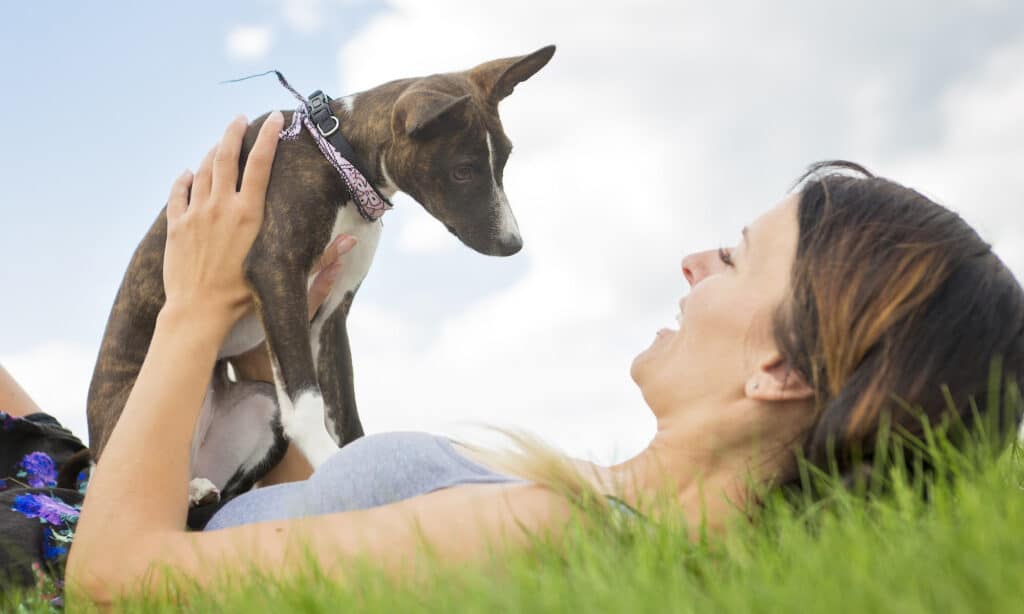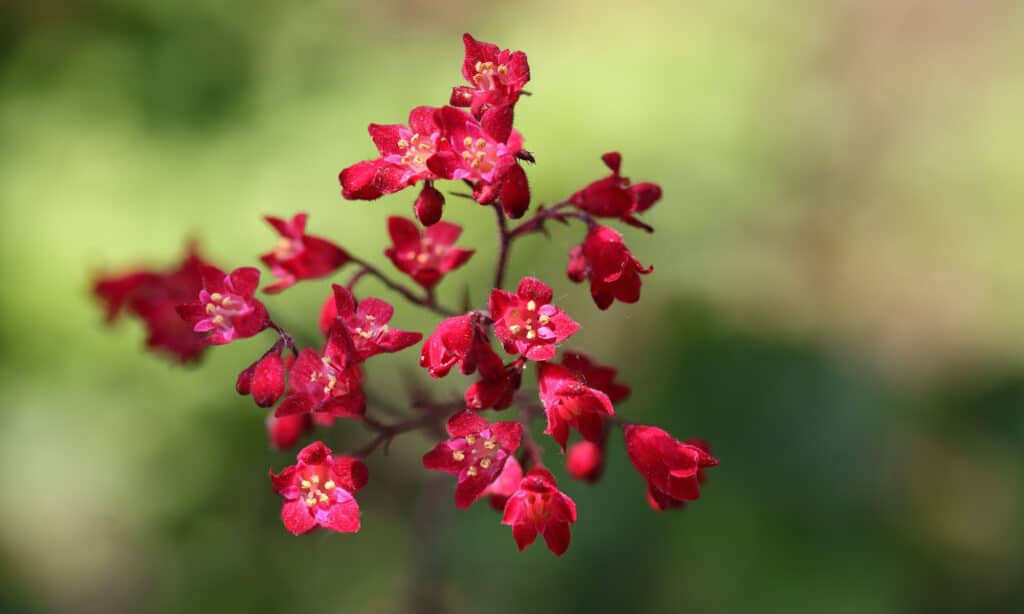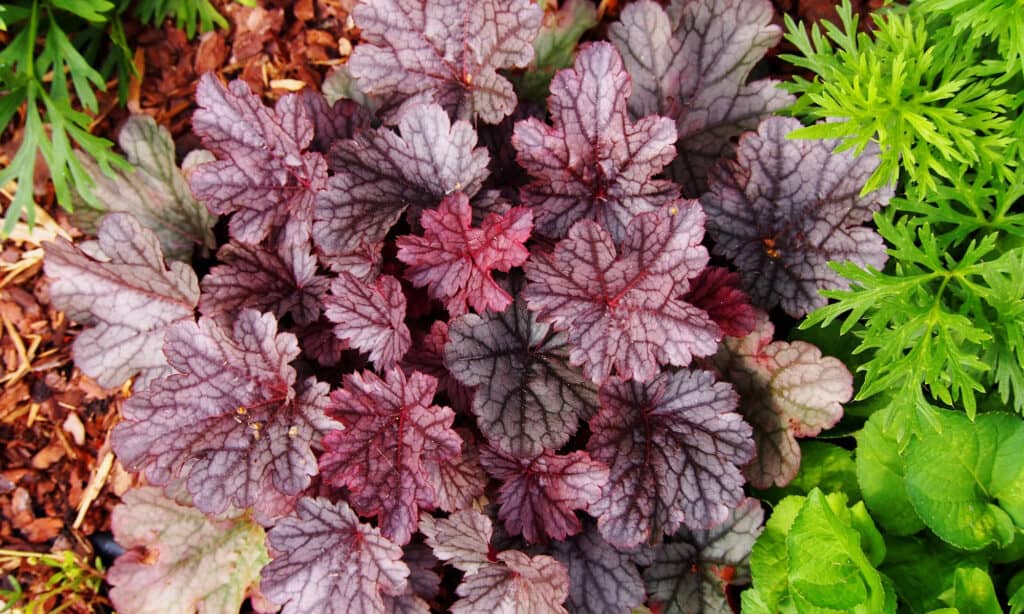It’s common knowledge that dogs are naturally curious creatures who enjoy exploring their surroundings. However, despite our best efforts to keep them safe, accidents can happen, especially if they consume toxic plants. One plant that dog owners may be concerned about is coral bells, also known as Heuchera. Coral bells are a popular garden plant admired for their attractive foliage and flowers. While these plants are considered safe for humans, there have been concerns about their toxicity to dogs.

The good news is that according to the ASPCA, coral bells are not toxic to dogs. This means that if your furry friend ingests some, it’s unlikely to cause any harm or adverse reactions. However, as with any plant material, it’s still important to monitor your dog’s behavior and health, especially if they consume large amounts of coral bells. If you notice any unusual symptoms or changes in your dog’s behavior, it’s always best to contact your veterinarian for advice.
By understanding which plants are toxic to dogs, we can take steps to protect our furry friends from potential harm. Thankfully, coral bells are not one of those plants, and we can continue to enjoy their beauty in our gardens without worrying about our dogs’ safety.

Are Coral Bells Toxic To Dogs?
There has been some confusion and concern among dog owners regarding the potential toxicity of coral bells, also known as Heuchera, to dogs. Some sources have claimed that these plants can be poisonous if ingested, while others suggest that they are safe for dogs to consume.
According to the ASPCA, coral bells are not toxic to dogs. This means that if your furry friend ingests some, it’s unlikely to cause any harm or adverse reactions. However, as with any plant material, it’s still important to monitor your dog’s behavior and health, especially if they consume large amounts of coral bells. If you notice any unusual symptoms or changes in your dog’s behavior, it’s always best to contact your veterinarian for advice.
It’s worth noting that while coral bells are not toxic to dogs, there are many other plants that are. Some common examples include lilies, azaleas, and tulips. If you have any of these plants in your garden or home, it’s important to keep them out of reach of your pets to avoid any potential harm.
What Are Coral Bells?
Coral bells are a type of perennial plant that originate from North America and are scientifically known as Heuchera. They are a popular choice among gardeners due to their attractive foliage and flowers that come in a variety of colors such as pink, red, purple, and green. Typically, these plants can grow up to 18 inches tall and spread up to 24 inches wide.
One of the distinctive features of coral bells is their lobed leaves, which have a glossy or matte finish and come in different shades of green, purple, bronze, and silver. During the spring and summer months, they produce small bell-shaped flowers on tall spikes.
Aside from being a garden favorite, coral bells are also used in herbal medicine for their anti-inflammatory and antioxidant properties. However, it’s important to note that while they may be beneficial for humans, they can be harmful to dogs if ingested.

What Should You Do If Your Dog Eats Coral Bells?
Firstly, it’s important to know that coral bells are not toxic to dogs. This means that if your dog eats some, it’s unlikely to cause harm or negative reactions. Nevertheless, it’s still crucial to keep an eye on your dog’s behavior and health, particularly if they consume large amounts of coral bells.
If you notice that your dog has eaten coral bells, try to stay calm. Monitor your dog closely for any signs of discomfort or illness, such as vomiting or diarrhea. If your dog exhibits any symptoms, it’s important to contact your veterinarian immediately for guidance.
In some cases, your veterinarian may recommend bringing your dog in for an examination to ensure that they aren’t experiencing any negative effects from consuming the coral bells. They may also suggest treatment to relieve any symptoms your dog is experiencing.
Remember, it’s always best to err on the side of caution when it comes to your pet’s health. If you suspect that your dog has eaten something harmful or toxic, don’t hesitate to seek veterinary care. Taking quick action can help ensure that your furry friend stays healthy and safe.
Potential Physical Dangers Presented by Coral Bells
Although coral bells are not toxic to dogs, they can still present physical dangers if consumed in large amounts. The plant’s fibrous and stringy texture, for example, can cause blockages in the digestive tract, leading to serious health issues.
Moreover, some dogs may be allergic to certain compounds present in coral bells, such as saponins and oxalates, which can cause skin irritation, rashes, or hives.
Additionally, the sharp edges of the plant’s leaves can injure your dog’s mouth, tongue, and throat if they are not chewed properly or consumed in large quantities.
If you suspect that your dog has eaten a significant amount of coral bells, closely monitor their behavior for symptoms like vomiting, diarrhea, lethargy, or loss of appetite. In such cases, it’s essential to seek veterinary care immediately.
To prevent potential physical dangers associated with coral bells, it’s important to keep them out of your dog’s reach. Make sure to secure your garden and indoor plants adequately to prevent your curious furry friend from accessing them.
By being aware of the possible physical dangers of coral bells and taking measures to prevent your dog from consuming them, you can help ensure that your beloved pet stays healthy and safe.

Signs and Symptoms of Coral Bell Ingestion
As we know, coral bells are not toxic to dogs, but they can still cause physical harm if consumed in large amounts. If your dog ingests a significant amount of coral bells, they may exhibit signs of digestive distress, such as vomiting or diarrhea.
In addition, dogs may experience discomfort and irritation in their mouth, throat, and stomach if they eat coral bells. This can lead to excessive drooling, pawing at the mouth, and difficulty swallowing.
Some dogs may also have an allergic reaction to compounds found in coral bells, resulting in symptoms such as skin irritation, rashes, or hives.
It’s worth noting that not all dogs will display symptoms after consuming coral bells, and some may not exhibit any adverse effects at all. However, if you notice any unusual behavior or changes in your dog’s health, it’s best to contact your veterinarian for guidance.
If you suspect that your dog has ingested coral bells, it’s important to monitor their behavior closely for any signs of illness or discomfort. In cases of severe or prolonged symptoms, seek veterinary care as soon as possible.
By being aware of the signs and symptoms of coral bell ingestion and taking steps to prevent your dog from consuming them, you can help keep your furry friend safe and healthy.
When Should You Take Your Dog To The Vet?
Ingesting coral bells likely will not require a vet visit. However, if your dog is displaying any of the following symptoms after ingesting coral bells, you should seek veterinary care immediately:
- Vomiting and diarrhea that is persistent or severe
- Excessive drooling
- Difficulty breathing or swallowing
- Lethargy or weakness
- Loss of appetite
- Yellowing of the skin or eyes
If your dog is experiencing any of these symptoms, it’s important to seek veterinary care as soon as possible. Your vet will be able to assess your dog’s condition and provide appropriate treatment to alleviate their symptoms and minimize any potential physical dangers presented by coral bells.
Early intervention is crucial when dealing with toxic plant ingestion, as delaying treatment can result in further complications and more severe symptoms.

Prevention Is The Best Medicine – How To Prevent Your Dog from Eating Coral Bells
Preventing your dog from eating any plants is the best way to avoid potential harm from toxins. Here are some tips to help prevent your dog from consuming coral bells:
- Keep coral bells out of reach: If you have coral bells plants in your home or garden, make sure they are placed in an area that is inaccessible to your dog. This could mean keeping them on a high shelf or behind a barrier.
- Use deterrents: You can use natural deterrents, such as citrus or vinegar sprays, to discourage your dog from approaching coral bells plants.
- Offer safe and appropriate chew toys: Dogs have a natural instinct to chew, so providing them with safe and appropriate chew toys can help prevent them from chewing on plants.
- Supervise your dog: When spending time outside with your dog, make sure you supervise them to ensure they don’t consume any toxic plants.
- Learn about toxic plants: Educate yourself about the plants that are toxic to dogs, including coral bells, so you can take appropriate measures to prevent your dog from ingesting them.
By taking these preventative measures, you can help keep your furry friend safe from the potential physical dangers presented by coral bells.
So, Why Do Dogs Eat Coral Bells?
There is no definitive answer as to why dogs are attracted to eating coral bells, but there are a few possible reasons.
- Curiosity: Dogs are naturally curious animals and may be attracted to the bright colors and unique texture of the coral bells plant. They may explore the plant with their mouth, leading to ingestion.
- Boredom: Dogs who are bored or lack mental stimulation may turn to chewing on plants as a way to relieve their boredom.
- Nutritional deficiency: Some dogs may be attracted to eating plants due to a nutritional deficiency, such as a lack of fiber or vitamins in their diet.
- Behavioral issues: Dogs with behavioral issues, such as separation anxiety or stress, may turn to eating plants as a coping mechanism.

Conclusion
To sum it up, coral bells are not toxic to dogs, but they can still cause physical harm if consumed in large amounts. The toxins in coral bells can lead to a range of physical symptoms in dogs, and it’s important to take action quickly to prevent any potential dangers.
Preventing your dog from eating coral bells is the best way to keep them safe from harm. By taking preventative measures, like keeping coral bells out of reach, providing safe chew toys, and supervising your dog when outside, you can minimize the risk of coral bell ingestion.
If you suspect that your dog has ingested coral bells, seek veterinary care immediately. With prompt treatment and care, your furry friend can make a full recovery and return to their happy, healthy self.
Remember, the best approach to keeping our dogs safe and healthy is to prevent any potential harm in the first place. Take the necessary steps to keep toxic plants out of your dog’s reach and provide them with a safe and stimulating environment.
~Sheena
